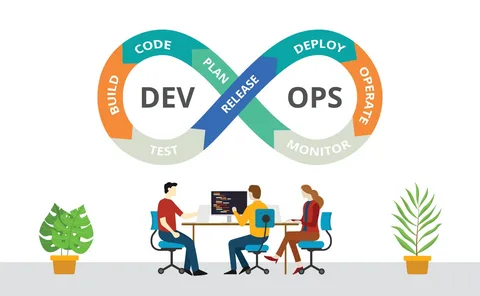
Unlocking Efficiency and Innovation: The Power of DevOps Outsourcing
In today’s fast-paced digital landscape, businesses are under increasing pressure to deliver high-quality software at a rapid pace while maintaining reliability, security, and scalability. DevOps, a set of practices that combines software development (Dev) and IT operations (Ops) to shorten the software development lifecycle and deliver continuous value to customers, has emerged as a game-changer in this regard. However, implementing DevOps practices effectively requires specialized skills, expertise, and resources, which many organizations may not possess in-house. This is where DevOps outsourcing comes into play. In this article, we’ll explore the concept of DevOps outsourcing, its benefits, challenges, and best practices for successful implementation.
Understanding DevOps Outsourcing
DevOps outsourcing refers to the practice of engaging external service providers or partners to manage and streamline the DevOps processes and workflows within an organization. These service providers typically offer a range of DevOps-related services, including infrastructure automation, continuous integration and delivery (CI/CD), cloud management, monitoring and alerting, and security and compliance.
Benefits of DevOps Outsourcing
DevOps outsourcing offers several compelling benefits for organizations looking to accelerate their software delivery and improve operational efficiency:
Access to Specialized Expertise
By outsourcing DevOps functions to experienced service providers, organizations gain access to a team of skilled professionals with expertise in various DevOps tools, technologies, and best practices. This allows organizations to leverage the latest advancements in DevOps without the need for extensive training or hiring additional staff.
Cost Savings
Outsourcing DevOps can be a cost-effective solution for organizations, as it eliminates the need to invest in expensive infrastructure, tools, and personnel. Instead of maintaining an in-house DevOps team, organizations can pay for DevOps services on a subscription or pay-as-you-go basis, reducing upfront capital expenditures and ongoing operational costs.
Faster Time-to-Market
DevOps outsourcing enables organizations to accelerate their software delivery cycles by automating manual tasks, streamlining processes, and implementing CI/CD pipelines. This results in shorter release cycles, faster time-to-market for new features and updates, and ultimately, a competitive edge in the marketplace.
Scalability and Flexibility
Outsourcing DevOps allows organizations to scale their DevOps capabilities up or down based on project requirements and business needs. Whether it’s handling a sudden increase in workload, expanding into new markets, or adapting to changing customer demands, outsourcing provides the scalability and flexibility needed to stay agile and responsive in a dynamic business environment.
Challenges of DevOps Outsourcing
While DevOps outsourcing offers many benefits, it also presents certain challenges and considerations that organizations must address:
Integration with Internal Processes
Integrating outsourced DevOps functions with internal development and operations processes can be challenging, particularly if there is a lack of communication, collaboration, or alignment between internal teams and external service providers. Effective communication, clear expectations, and defined roles and responsibilities are essential for successful integration.
Data Security and Compliance
Outsourcing DevOps functions may raise concerns about data security, privacy, and compliance, particularly if sensitive or confidential information is involved. Organizations must ensure that their service providers adhere to industry best practices and compliance standards, such as GDPR, HIPAA, or PCI DSS, and implement robust security measures to protect data assets.
Vendor Reliability and Performance
Choosing the right DevOps outsourcing partner is crucial for success. Organizations must thoroughly evaluate potential service providers based on their track record, reliability, performance, and ability to meet SLAs (Service Level Agreements). Regular monitoring, performance reviews, and open communication are essential for maintaining a positive vendor-client relationship.
Best Practices for DevOps Outsourcing
To maximize the benefits of DevOps outsourcing and overcome potential challenges, organizations should follow these best practices:
Define Clear Objectives and Expectations
Clearly define your goals, objectives, and expectations for DevOps outsourcing, including desired outcomes, key performance indicators (KPIs), and success criteria. Communicate these objectives to your service provider to ensure alignment and accountability.
Establish Strong Communication Channels
Foster open and transparent communication channels between internal teams and external service providers. Regular meetings, status updates, and progress reports help ensure that everyone is on the same page and working towards common goals.
Invest in Training and Knowledge Transfer
Provide training and knowledge transfer sessions to your internal teams to ensure they understand the DevOps processes, tools, and methodologies being implemented by the outsourcing partner. This empowers internal teams to collaborate effectively with the service provider and contribute to the success of the project.
Monitor Performance and Provide Feedback
Continuously monitor the performance of your outsourcing partner against agreed-upon SLAs and KPIs. Provide constructive feedback and address any issues or concerns promptly to maintain a high level of service quality and drive continuous improvement.
Conclusion
In conclusion, DevOps outsourcing offers organizations a strategic approach to accelerate their software delivery, improve operational efficiency, and drive innovation in today’s competitive business landscape. By leveraging the expertise of external service providers, organizations can access specialized skills, reduce costs, and scale their DevOps capabilities to meet the demands of a rapidly evolving market. However, successful DevOps outsourcing requires careful planning, effective communication, and collaboration between internal teams and external partners. By following best practices and addressing potential challenges, organizations can unlock the full potential of DevOps outsourcing and achieve their business objectives with confidence.





Leave Your Comment